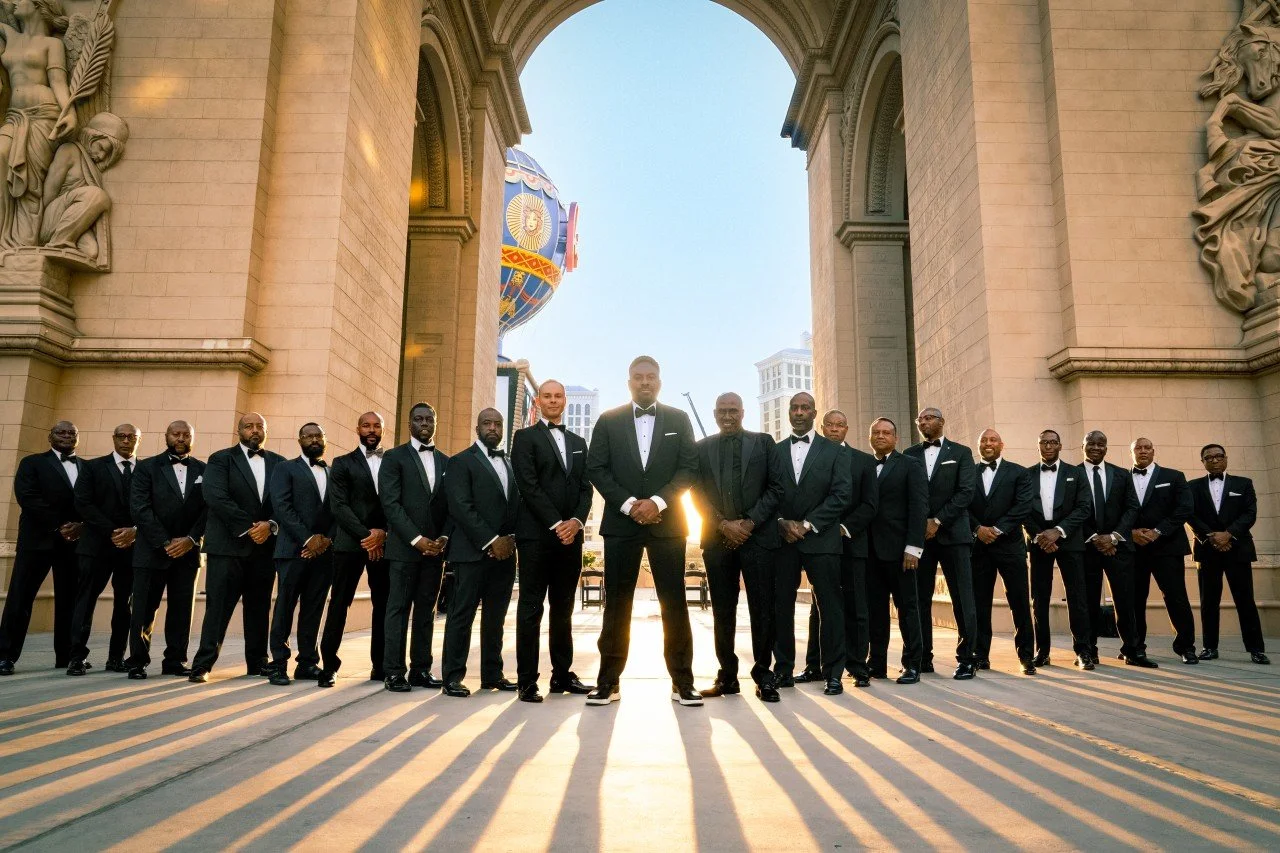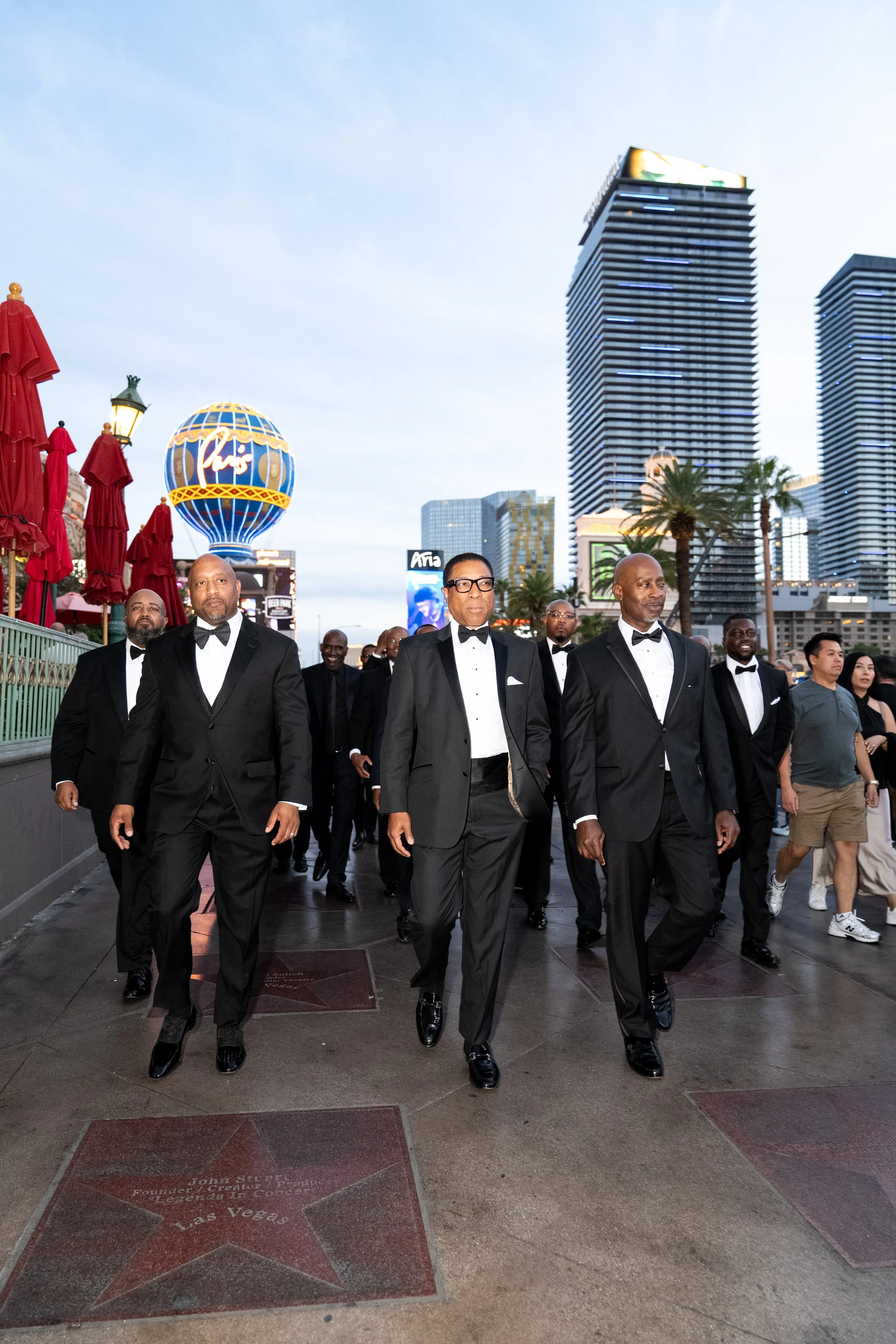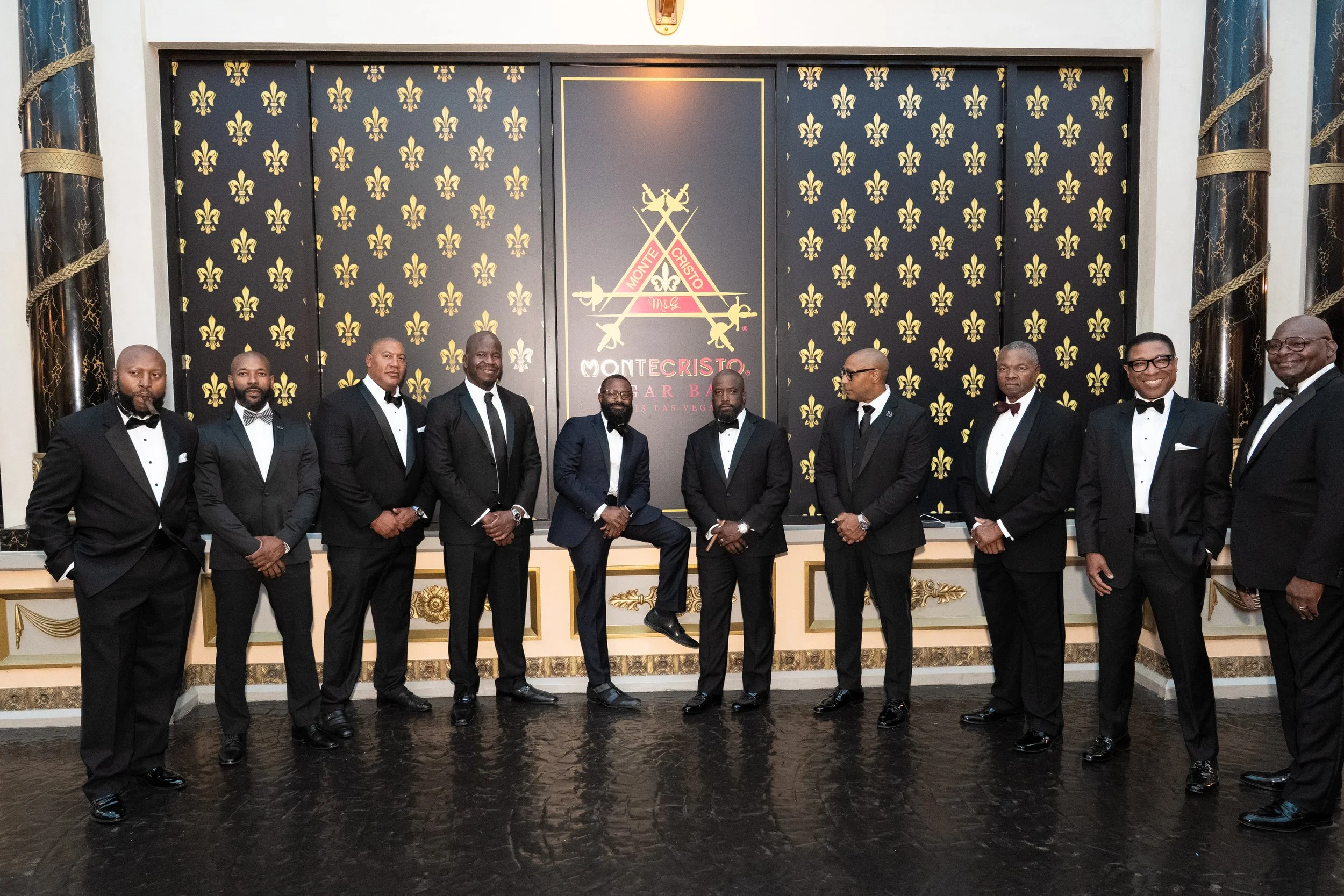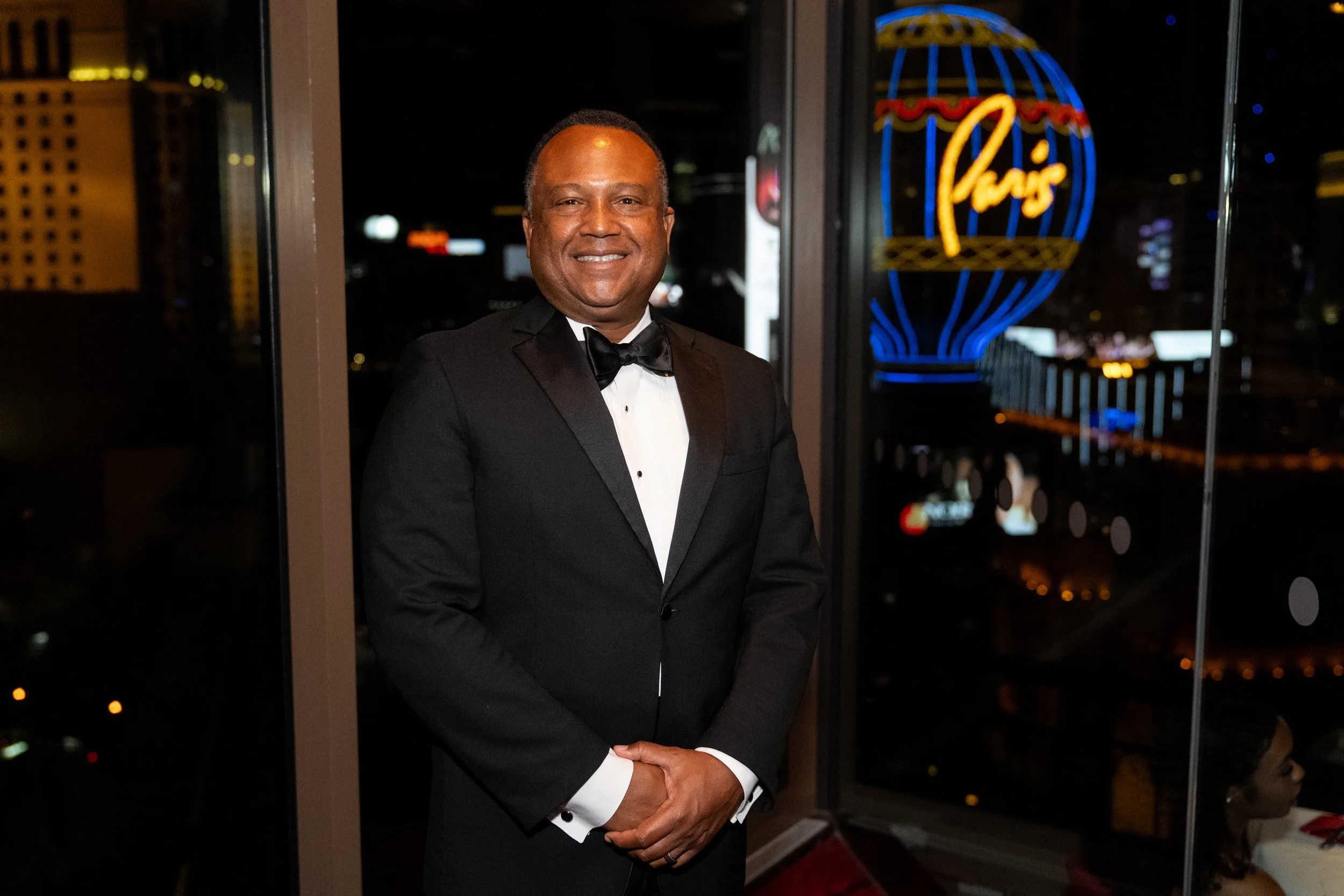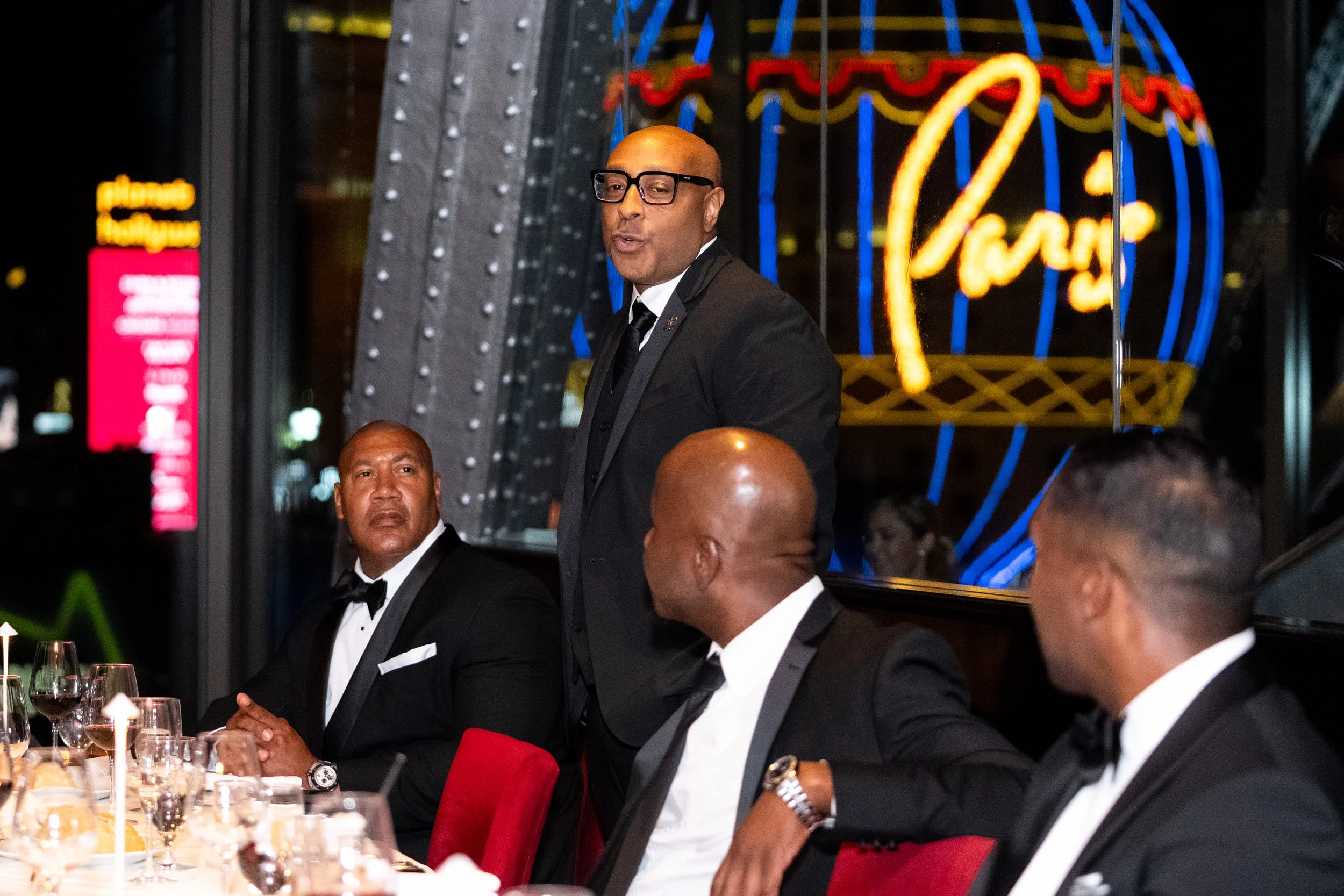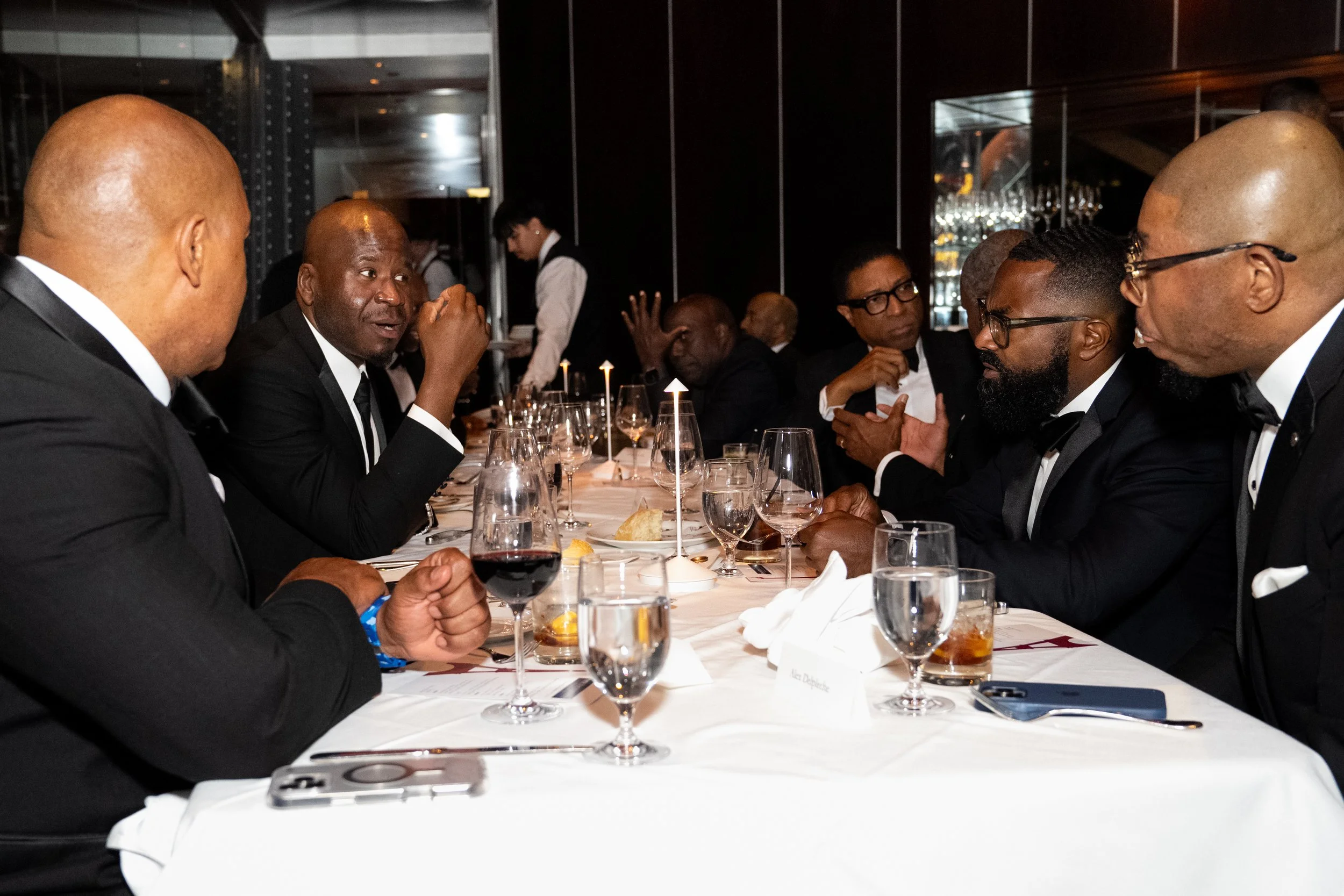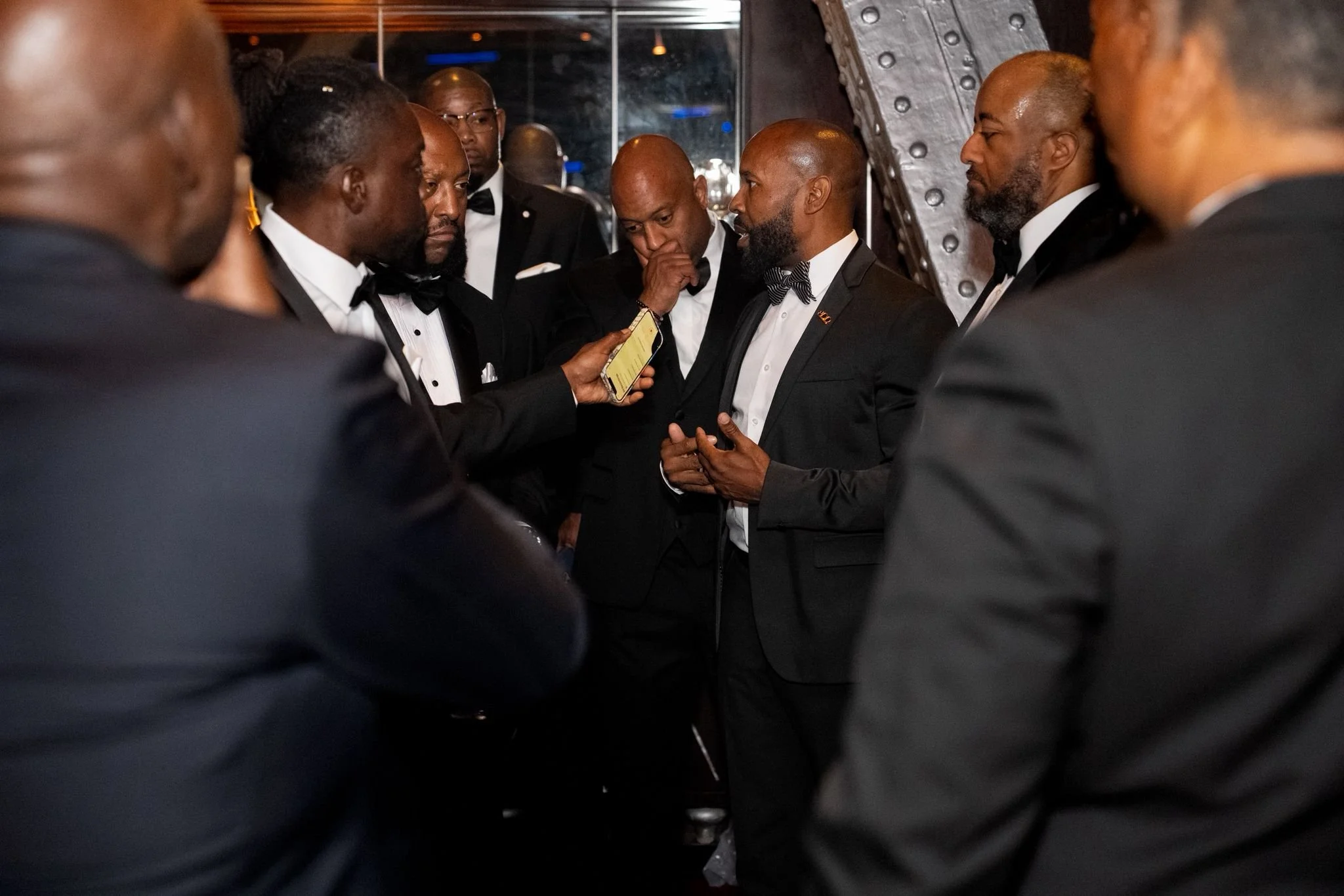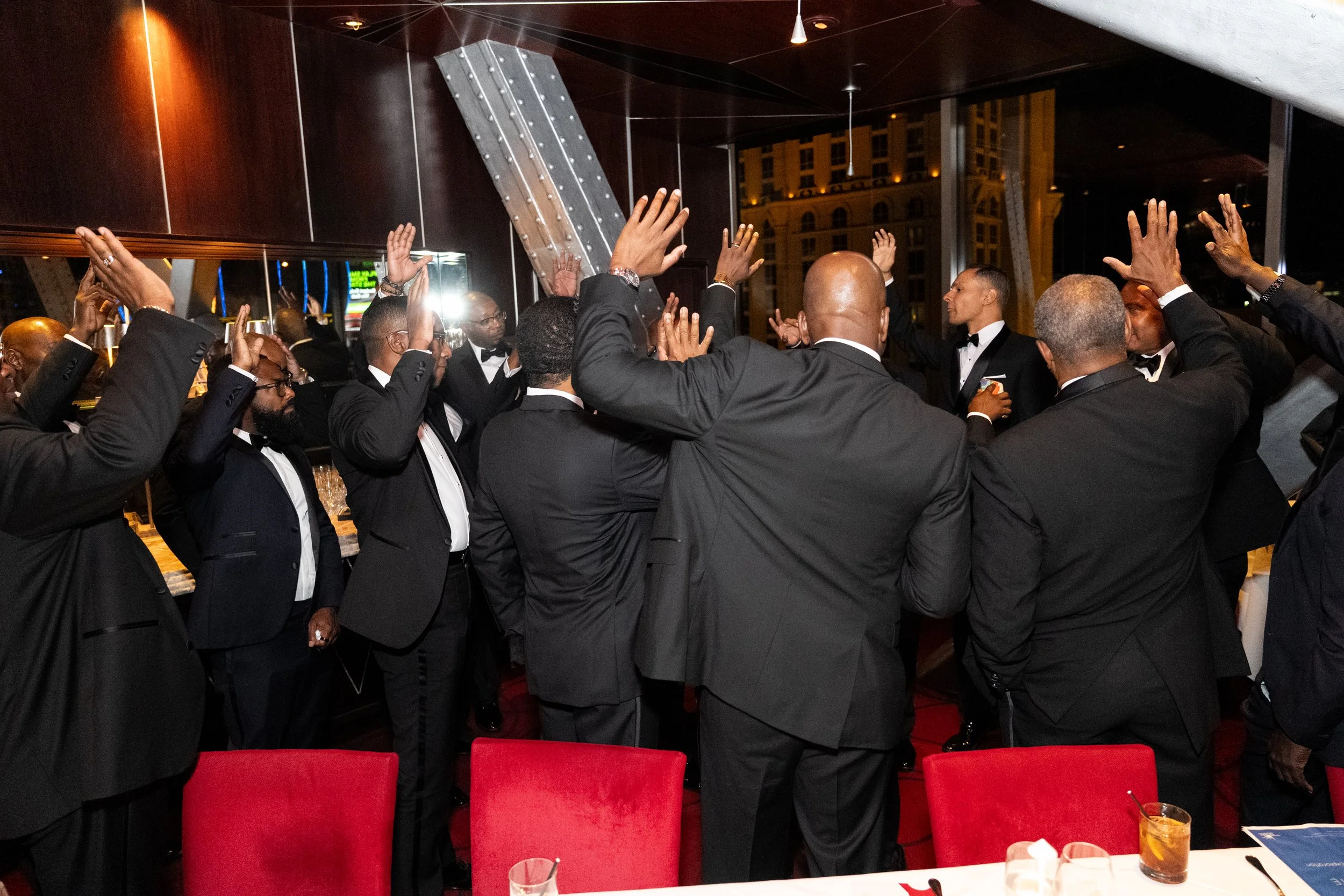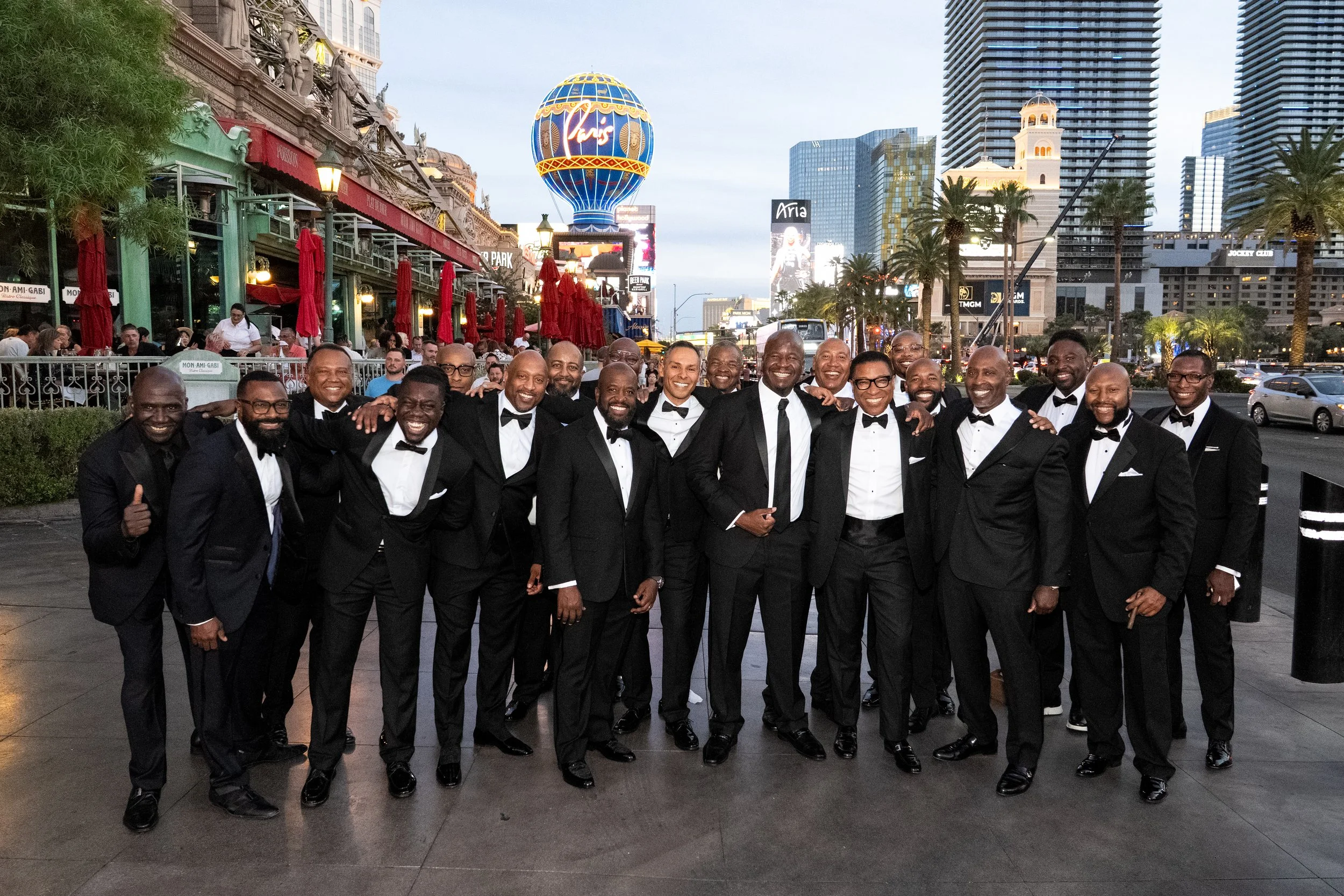Twenty Tuxedos, One Vision: How Black Executives Rewrote the Rules in Vegas
By Leroy Adams
Photo credit: kvonfoto
In just twelve months, Black Executive Men - a collective of mid-level, senior, C-suite executives, and board directors - has created one of the most culturally powerful—and financially serious—networks in corporate America.
To The Very Last Man
For most people, the question "What's next?" comes with uncertainty. For Jewel Love, founder of Black Executive Men, it came with crystal clarity: Vegas.
Pictured: Jewel Love, founder of Black Executive Men, addresses the group in Vegas.
What started a decade ago as a psychotherapy practice for Black men in corporate America had grown over the last year into one of the largest communities connecting hundreds of mid-level, senior, C-suite executives, and board directors across the country and internationally. Success had arrived faster than anyone anticipated. With it came the inevitable crossroads that every group of highly ambitious, high-achieving Black men eventually faces: What else are we doing this for? How can we make real financial and cultural impact together?
The men understood the necessity of first cultivating a network of brothers who believed in community, trust, and making deals together—and many felt they were on a promising path with those foundations. Now it was time to be more visible and create measurable impact. Many were either already successful and wealthy or well on their way, which only intensified the fundamental question that would define their collective legacy: Will they pull the ladder up behind them, or extend it to the very last man?
The answer wouldn't come from another conference call or networking mixer. It required something bigger, bolder—a moment that would crystallize their purpose and test their commitment to each other and future generations of Black executives.
In Vegas, they would get their answer.
Luxury Is The Standard
Picture this: you're walking down Las Vegas Boulevard, surrounded by typical Vegas energy—on your left, a band belting out their cover of "Hotel California;" on your right, photographers with elaborate setups promising the perfect Vegas shot; behind you, golden hour light filtering through the illuminated skyscrapers. Walking toward you is something extraordinary: a procession of twenty Black men in tailored tuxedos, accompanied by their own photographer and videographer capturing every confident stride. Do you cross the street? Goodness, I hope not. More likely, you find yourself doing what the other passersby and even the Hotel California band did—breaking your neck to catch a glimpse of this powerful display. If you're like the tourists, you might even whip out your cameras and capture the moment yourself.
Jewel has never been shy about the intent of celebrating Black men and creating luxury experiences that make them feel recognized, valued, and unapologetically visible. “It’s showing Black male unity in a professional setting of guys building together in high-end environments. Luxury has to be a part of the experience.” he shared with me at their 2024 Miami event.
Vegas delivered on every level. The evening began with the men gathering in the opulent lobby of the Paris Las Vegas, where they assembled beneath the hotel's iconic archways for a welcome ceremony and photoshoot. As Jewel instructed, dinner would commence at 7 PM sharp, but from 6:00 to 6:45, the production team would capture them in their black-and-white formal wear across multiple locations—individual portraits and group compositions to commemorate this historic moment. These would become memories to reflect upon during those inevitable moments of isolation that many experience as one of few Black executives in corporate America. Jewel, reflecting on his why and leaning on his decades of experience providing psychotherapy to Black men in corporate America, touched on the issue of isolation: "I learned how isolated, unseen, and alone Black men are in corporate America, but how educated and talented they are—and that there was an opportunity to be of service," he shared while nodding toward the production team.
Why Vegas? It represented the vision Jewel saw for Black Executive Men. "Vegas came from nothing. It was a vision and a dream—a world-class destination for presidents, kings, and sultans, alongside modest family vacationers, all together in a city of lights and thrills," he said, gesturing at the tourists walking past us and world-renowned hotels like the Bellagio towering over us.
Like Black Executive Men, Vegas had modest beginnings. In 1940, the city had fewer than 40,000 inhabitants. In less than fifteen years, it grew to one million. In one short year, Black Executive Men grew from a handful of men to thousands seeking community, career support, and an opportunity to build alongside other brothers.
Much like Howard Hughes, who in 1966 checked into the penthouse of the Desert Inn and never left, recognizing the potential of the former desert, Jewel saw similar possibilities. Hughes would go on to buy other hotels—$300 million worth—ushering in an era of legitimate Vegas business.
For Jewel, the empty desert—where nothing grows and travelers wander alone—was an analogy for the isolation and invisibility Black men experience in corporate America. He would finish with a pointed question for the group: "What can we build from this isolation for the world to see?"
For forty-five minutes—and not a second longer, because perfectly crafted Old Fashioneds awaited—the men had themselves an absolute celebration taking photos throughout the Paris hotel. From commanding the majestic archways to looking distinguished under the ballroom's crystal chandeliers, they captured the attention of everyone around them. Other men questioned their own evening attire while women took lingering glances, visibly disappointed by the wedding rings adorning several fingers.
A group of Black men commands attention anywhere they go. Dress them in impeccably tailored tuxedos with a hint of cologne, and you've created a red-carpet moment in the heart of a Vegas hotel. Perhaps for the first time in months, these men had laid down their professional armor, giving themselves permission to simply exist in joy. Their radiant smiles and confident swagger communicated one unmistakable message: we belong here, as they ascended to the top of the Eiffel Tower hotel for a dinner fit for kings.
Ubuntu Is The Pledge
"If I can put money in your pocket, I'm happy to do it," declared Joe Hurd, FTSE 100 Director and former Obama Administration appointee, and Keynote speaker for the event, his voice carrying across the elegant dining room. "Second, I practice Ubuntu. Ubuntu is an African philosophy meaning 'I am because we are.' I find joy in creating opportunities for others, whether helping people secure board positions or assisting CEOs in scaling their businesses. My personal motto is simple: count assists, not points scored."
Pictured: Joe Hurd
Framed by the illuminated neon blues and golds of the Paris hotel and the gold glittering lights of the Bellagio and Wynn hotel in the distance, Joe stood energized by both the restless energy of the Strip forty stories below and the pure ambition radiating from his brothers. His words set the tone for the remainder of the evening: advancing together.
Crisp white tablecloths stretched across the room, each place setting adorned with crystal wine glasses and menu cards specially curated for Black Executive Men. One by one, each man introduced himself to the gathering, forging new connections or rekindling relationships from previous Black Executive Men events with old friends—some now business partners. The room grew reverently quiet as Roosevelt Giles shared his story, extending his weathered palms toward the group while gazing down at his hands.
"My parents picked cotton. I was a sharecropper," he said, his voice steady with the weight of lived experience. Wine glasses were gently placed on tables as every man leaned forward, hanging on his words. "Today, I'm an internationally recognized thought leader on business transformation and Founder of EndPoint Ventures, with investments spanning over thirteen companies across five U.S. cities, plus offices in Malaysia, India, South Africa, and China."
Pictured: Roosevelt Giles
Respectful applause rippled around the room—measured so as not to interrupt his flow.
"I believe in what we're building here." True to his words, Roosevelt established a generous partnership with Black Executive Men, providing Vice Presidents and C-level executives access to his 2026 Board Readiness program. "It's necessary, and we can achieve it together," he concluded, sitting to a chorus of raised glasses.
If Joe and Roosevelt's words served as a call to action, then Derrick Pledger's message was an outright demand. Just two weeks prior, Derrick had stood before the New York Stock Exchange bell celebrating Maximus' 50th anniversary, where he serves as Chief Digital & Information Officer. Now, his voice carried urgent conviction.
Pictured: Derrick Pledger
"We must create impact, and we need to be visible doing it. We cannot—and should not—remain a secret any longer."
His declaration provided the perfect segue for Jewel's challenge: connect with your tablemates and share your business commitments for the next 365 days. I moved throughout the room, listening to conversations unfolding between bites of perfectly prepared filet mignon and sips of bourbon-smoked old fashioneds or glasses of 2019 Red Blend Château Maurac. The goals were audacious: increasing assets under management to $1 billion, taking companies public, acquiring 400 additional acres of tobacco farmland, implementing international business curriculum in Oakland public schools, and in John Lancaster's case, Senior Vice President of Franchise Development at Choice Hotels International, increasing Black hotel ownership.
Three delicate crystal taps sliced through the symphony of conversations bouncing off the floor-to-ceiling windows overlooking the Vegas skyline, bringing instant silence to the room. Jewel stood at the head of the gathering, an elegant scroll unfurled in his hands. At the top, embossed letters read: "Black Executive Men Corporate Icons Pledge." Jewel's voice carried across the room with his next challenge: "Are you also considering talented mid-level Black executives for sponsorship next year? Share their names with your tablemates." The room buzzed as men began identifying rising talent within their organizations—proteges, colleagues, and promising leaders who deserved the same opportunities they were creating for themselves.
Years of providing psychotherapy to Black men in corporate America had revealed a painful truth hiding in plain sight: despite driving profitability and innovation at the highest levels of American business, Black executives often do so while managing isolation—frequently being "the only one in the room"—with minimal community support and no culturally rooted career guidance. For those reasons, Black Executive Men has gained widespread recognition among board directors, executives, investors, and mid-level leaders precisely because it provided both community and professional advancement. The pledge represented their collective commitment to supporting one another’s professional and interpersonal success, as it read: "To achieve and amplify iconic corporate leadership worldwide through strategic sponsorships, ensuring that future generations of corporate Black men see a clear, accessible path to the summit... We pledge to collectively sponsor 10,000 corporate Black men to reach C-suite positions, guaranteeing the next generation surpasses our own achievements."
One by one, with a Montblack Meisterstück pen, each man signed the scroll, passing it to his neighbor—his brother in this mission.
Pictured: Brandon Brumfield signs The Pledge.
By every measure, the evening had been a resounding success: new relationships forged, business opportunities identified, and a concrete plan for generational impact established. However, as the applause faded, it was replaced by something more urgent—a collective itch to transcend words and transform intention into investment.
We Can Do More
Like any startup navigating early-stage market penetration, Black Executive Men was still defining its ultimate identity and impact strategy. Would they continue with their proven formula—curated luxury experiences, career development, and an unparalleled corporate network centering Black men?
"It's not enough," Derrick Pledger said quietly, and I noticed the conflicted expression crossing his face as the group celebrated their pledge. I pulled him aside. "We can do more. We can invest," he continued with growing intensity.
Pictured: Bryant Henson
His sentiment echoed throughout the room. What was the purpose of investing only time, travel and insights, resources, and boardroom influence when twenty men in this space wore timepieces rivaling home down payments and could casually purchase bottles of 2021 Domaine de la Romanée-Conti for dinners with their wives? Jewel’s grand vision of filling Allegiant Stadium with 65,000 Black men from corporate America demanded more than pledges—it required greater access to leading corporate opportunities and building first, capital raised collectively and reinvested strategically, second.
Pictured: Jewel leads the men in a discussion on investments.
A circle began forming in the restaurant's center as I quickly pulled out my phone, recognizing I was witnessing history in real time.They intensely moved beyond the planned agenda, and began leading a realtime investment effort that could shape the culture of BEM and the financial outcomes of larger Black community for generations to come. Fifty years from now, when the executives of BEM are ringing the opening bell at various stock exchanges, a new generation of Black men—standing on the shoulders of the men in this circle—will reflect on this pivotal moment.
Pictured: The men share their visions for collective investments.
The floor opened to ideas: Where should we invest, and why? For twenty transformative minutes, they stood sharing visions and analyzing industries—from hospitality and technology to agriculture and education. Each suggestion built upon the last, creating a symphony of strategic thinking rooted in both profit potential and community impact. What had begun as spontaneous passion quickly organized itself into structured strategy, with Jewel masterfully guiding this speeding plane of longing for collective impact among some of corporate America’s most powerful men. When the circle finally broke, applause celebrated not just a plan, but the birth of a new era in Black executive leadership—one where years of individual success would finally translate into collective power.
A New Era Begins
Pictured: Black Executive Men agrees on an investment strategy.
As the Vegas lights twinkled beyond the windows and Tributary cigars—made with five-year-aged tobacco grown from Dr. Rubin Crockell’s fields in the Dominican Republic—were passed around the room, the men of Black Executive Men had crossed a threshold. What began as networking had evolved into a pledge. What started as a pledge had transformed into investment. While the investment was financial, it represented something symbolic amongst these black men that they'd craved for years, trust. Trusting each other to harness their shared power and resources to construct a better future for black people. Something they needed each other for, and had finally been given.However it doesn't stop there. Next year they will be back with their entire Black Executive Men network. Pledging together in the hundreds to guide their members to the C-suite, board roles, and impactful collective investments that guide their futures for decades to come.
The question posed before and during the event—what does it all mean?—had been answered.
It means extending the ladder. It means Ubuntu in action. It means continuing to build a home for Black men in corporate America to cultivate relationships at the highest level of power and financial success, while, as Joe Hurd would say, “putting money in their pockets.”
The night was over and the decisions had been made.
The real work was just beginning.

